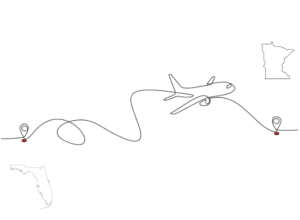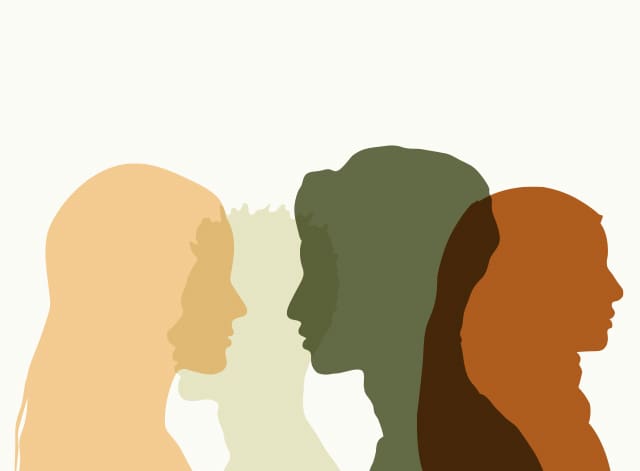Ayana’s Trafficking Journey

From Trafficking Victim to Healthcare Worker: A Survivor’s Journey
Every day, the International Institute of Minnesota assists foreign-born youth and adult survivors of human trafficking so they can rebuild their lives in Minnesota. These stories often go untold. Trafficking survivor Ayana*, an Institute client, shares her in-depth story to help raise awareness during National Human Trafficking Prevention Month.
*Ayana is a pseudonym used during her case’s ongoing legal investigation.
January 15, 2025 | When Ayana heard about an employment agent who could help her find work in the United States, it seemed like the opportunity she’d been waiting for. A hurricane had devastated her island home, causing her family’s rent to surge from $700 to $2,000 monthly, while job opportunities vanished.
Like many trafficking victims, Ayana was drawn in through social media, where traffickers — posing as legitimate employment agents — share compelling stories of well-paying jobs and successful lives in America. She dreamed her hard work could lead to schooling, becoming a nurse and more opportunity for her five children. She called the agent.
The contact told Ayana she could have a job if she could get herself to Miami. Unbeknownst to her, the confusing, demoralizing web of labor trafficking was about to begin.
“I never knew that coming to America and working was against the law. It might sound strange, but I didn’t know,” Ayana said.
Her story reveals how labor trafficking often operates through seemingly legitimate employment agencies. These agencies ─ actually traffickers ─ become the middlemen for payment, typically keeping 70 percent or more of the employer’s payment without the victim’s knowledge, leaving victims with a fraction of their earned wage or sometimes nothing at all.
The whole situation is enough to break anyone mentally. But I overcame it.
What Ayana’s story also reveals is how with persistence and support from organizations like the Institute, trafficking victims can rebuild a better, stronger and more fulfilling life.
“The whole situation is enough to break anyone mentally,” said Ayana, who now works as a certified nursing assistant. “But I overcame it. I pushed and I’m still pushing. I’m not done yet.”
How can this happen?
Immigrants are particularly vulnerable to labor trafficking precisely because of their unfamiliarity with U.S. laws and employment rights, and because traffickers maintain control by threatening eviction, deportation and more.
In most human trafficking situations, including Ayana’s, the prospective victim asks if the job is legal, explains Arhyel Ngada, an anti-trafficking case manager at the International Institute of Minnesota.
“But the traffickers know what to say to make it sound sweet,” he said.
Promises of work authorization, green cards and citizenship are common tactics used by labor traffickers. For Ayana and other victims who later receive Institute help to rebuild their lives, the reality is far different.
Ayana’s trafficking nightmare
Once Ayana and her 13-year-old son first arrived in Miami, paying for the flights and hotel themselves, she reconnected with her employment contact. That person offered her a job working the front desk of a two-star, national chain motel in northern Minnesota, plus room and board.
 Ayana paid for another flight to the Twin Cities, then bus tickets north. She wanted to “try it out,” hoping that a good job would lead to her husband and other children still in their home country being able to join her.
Ayana paid for another flight to the Twin Cities, then bus tickets north. She wanted to “try it out,” hoping that a good job would lead to her husband and other children still in their home country being able to join her.
At first, the situation seemed to be working out. Ayana’s son enrolled in school and she was paid for her work as expected, earning $13 an hour, minus $150 per week for the hotel room they lived in. A little over a month into her job, however, the motel closed because of mold and bed bugs.
Ayana’s trafficker sent her to another motel in North Dakota, where her son enrolled in a new school and she began working 48 hours a week, barely earning enough to pay her hotel rent. This time though, the hotel also offered her husband a job. He and their other children moved north.
The family was together again.
In less than two months, Ayana’s work hours were slashed to part-time, then to nothing. The motel also stopped assigning shifts to her husband. When they did receive pay, the couple had to ask for it. Every paycheck was different, with the cost of their room also fluctuating. Ayana’s trafficker often told her the motel hadn’t paid the agency yet, therefore they couldn’t send her payment either.
You’re unsure of what tomorrow looks like. Maybe you’ll get a paycheck, maybe you won’t.
The couple were reassigned to a motel back in northern Minnesota, forcing the children to change schools again.
“We barely had anything left,” Ayana said. “At that point my hands were tied. I couldn’t do anything. I couldn’t say anything. We just had to go along with it or we would be on the street.”
She and her husband worked seven days a week, “around the clock.” The family of six lived in a single motel room and sometimes didn’t have enough food.
“I continued to say it was okay and to suck it up because I wanted to keep my kids in one place. They had been moved so many times,” Ayana shared through tears.
Meanwhile, the trafficker asked Ayana and her husband to pay $6,000 each to get work authorization and social security numbers. If they didn’t, the trafficker said, the couple would no longer have jobs. Ayana and her husband didn’t know who to trust.
“You’re unsure of what tomorrow looks like. Maybe you’ll get a paycheck, maybe you won’t,” she said.
Ayana’s family escapes trafficking
The turning point came when a co-worker helped Ayana recognize their situation as human trafficking. She called the Department of Homeland Security (DHS), which quickly began investigating and connected the family to the Institute for help rebuilding their lives. Before they could leave, however, the hotel owner learned of law enforcement involvement and tried to evict the family in the middle of the night.
Arhyel, Ayana’s Institute case manager, helped them get immediate bus tickets to Minneapolis, where they arrived, shaken and exhausted, at 4 a.m. He also arranged for them to be welcomed to Mary’s Place, which provides shelter for homeless families in the Twin Cities.
Meanwhile, DHS processed Continued Presence for the family, allowing them to temporarily stay and work in the United States while they cooperate with the trafficking investigation.
“It is a traumatic experience to be trafficked. We are here to help trafficking survivors build their strength back,” Arhyel said about the Institute’s program. “We allow them to take the lead to say what they want to do in their future and what will make them happy. Then we advocate for them and follow up to make sure they’re connected to services.”
Turning their lives around
Ayana and her family lived in the Twin Cities shelter for seven months while she enrolled in the Institute’s Nursing Assistant Training — the first true step toward pursuing her nursing dream. She loved the class and passed her exams on the first try, becoming a certified nursing assistant (CNA).
I want to show my kids there’s more. There’s so much more … I’m not giving up.
Throughout the training, Arhyel worked with Ayana to help her identify goals and create steps to achieve them. Those goals included securing a job as a CNA, earning her GED, buying a car and most of all, “to have a stable home for my kids.”
Goal by goal, she’s checking off her achievements.
The family chose to move to a smaller city in Minnesota, where Ayana now works as a CNA in a group home. Her husband works in construction. The Institute helped the family secure an apartment, covering the security deposit and two months’ rent to help them get established. The couple’s stable paychecks allow them to pay rent so their children can have bedrooms for the first time since moving to the U.S.
Ayana recently bought a car and on top of her full-time job, she’s taking classes toward earning her GED. The family is also working with Advocates for Human Rights to apply for long-term immigration status. Immigration options for trafficking survivors can include T visas, which are special visas for trafficking victims that if granted, provide a pathway toward permanent residency, as well as other immigration options for crime victims.
Ayana plans to continue her schooling and eventually fulfill her dream of becoming a nurse, drawing continued motivation from her children.
“I want to show my kids there’s more. There’s so much more to come,” she said. “I’m not giving up.”
Reported and written by Alisa Blackwood, Communications Specialist at the International Institute of Minnesota. Alisa’s work at the Institute comes after years of writing for publications and organizations such as The Associated Press, O, The Oprah Magazine, and more. She hopes her writing about Institute clients, students and staff bring to life the stories behind the news headlines.
Your Support is Essential
Invest in the future of a foreign-born trafficking survivor. Your tax-deductible gift supports our work, helping survivors secure safe housing, access primary and mental health care, receive job training and more.
